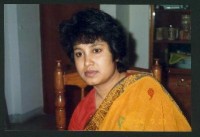Taslima case shows them up

You don¿t say!
Darius Nakhoonwala
Liberal values are the hallmark of all major Indian English newspapers – except when they clash with the ideologies of the parties that they support. It is, if you will, the equivalent of the "development is good, but not in my backyard syndrome".
So it is not surprising that every newspaper that wrote about the Taslima Nasreen affair took her side. But not every newspaper wrote. Prominent amongst those that did not was The Asian Age, that shining beacon of Muslim liberalism. I wonder why.
The Pioneer had taken exactly the opposite stand in the M F Hussein case saying that it was wrong to hurt peoples¿ religious sentiments. But this time it said artistic freedom was all that mattered. "By abjectly surrendering to fanatics and their illegitimate demand, the Marxists have set a dangerous precedent whose consequences will have to be borne by people across the country." Maybe, maybe not. Such dire warnings have been issued before by all political parties and their mouthpieces before.
The Telegraph, of course, was livid that the good name of
Then a bit of genteel abuse. "Like all most shamefully cowardly acts, the surrender to fundamentalism was disguised as aggression — a mouse¿s roar. Biman Bose, the state secretary of the CPI(M) and chairman of the Left Front, said, as if in a fit of pique, that if Ms Nasreen¿s presence causes so much trouble, she should go."
The Hindustan Times said that while
The really cheeky edit came from The Hindu, though. It was titled "Behind the Kolkatta violence", suggesting a conspiracy. And it said the CPM government there was not to blame. It did blame Biman Bose but praised him when he retracted his statement – after Ms Nasreen had left the state. It also criticized the Muslim fundamentalists, which is called editorial balance.
The Times of India said it best. "Those on the look out for ironies in politics would savour this. The BJP, not an unqualified supporter of the right to freedom of expression, is rooting for Taslima Nasreen whereas the CPM, which claims to uphold secular values, wants her to keep off Kolkata."
Touche.






